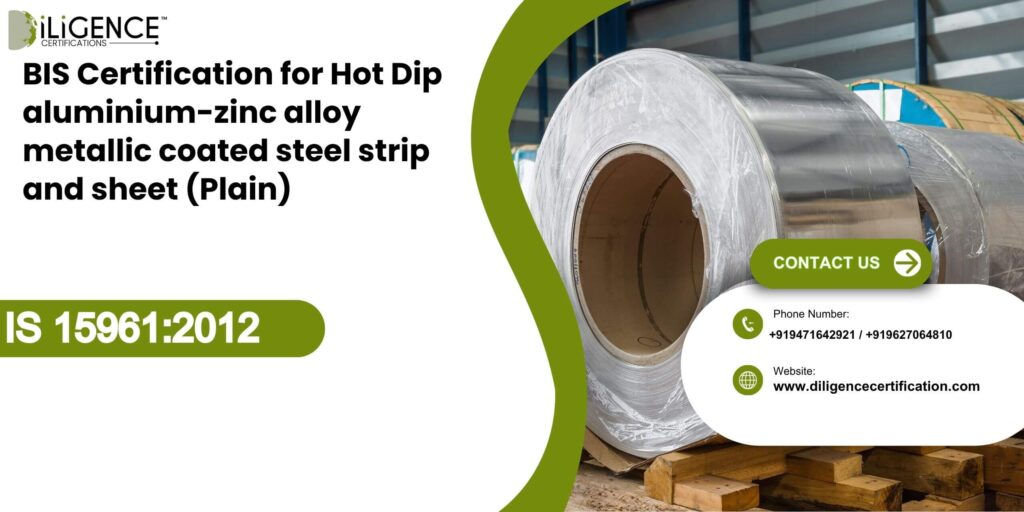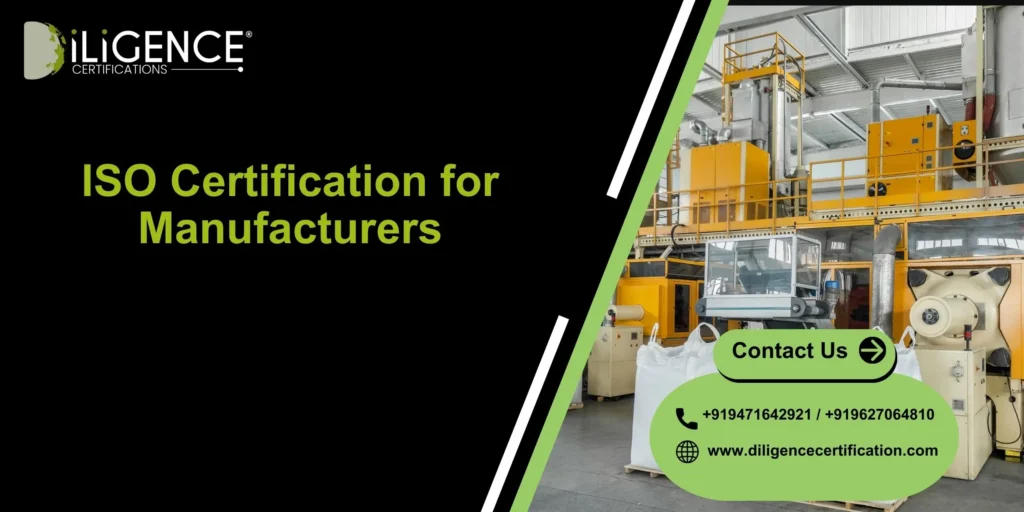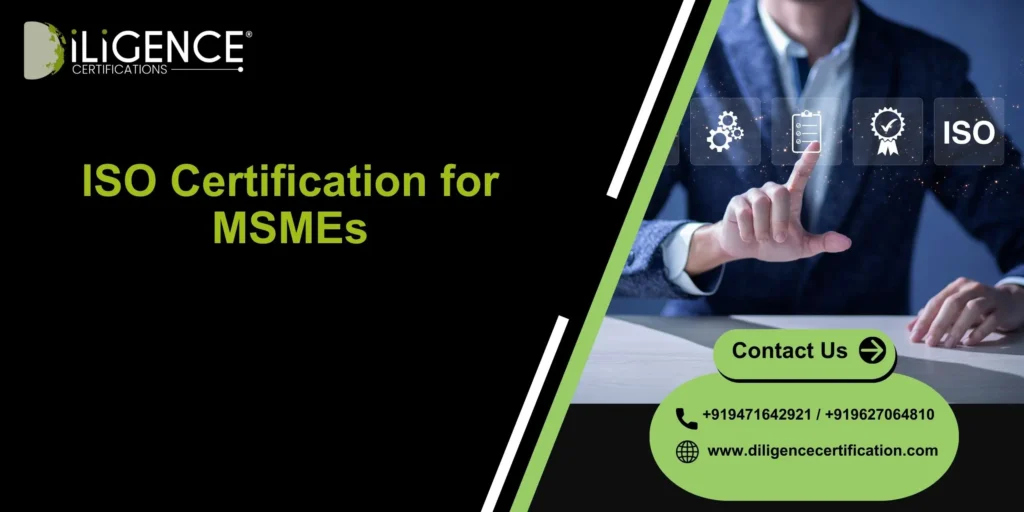- Hot Dip aluminium-zinc alloy requires BIS certification as per IS 15961:2012.
- The standard sets requirements for the product in terms of corrosion resistance, coating uniformity, and mechanical properties.
- Therefore, it finds a vast application in the roofing, solar structures, appliances, and construction industries.
- The steps are sample submission, plant inspection, and testing at a BIS-approved laboratory.
- Certification makes it easier to access the market, comply with regulations, and gain customers trust.
Introduction
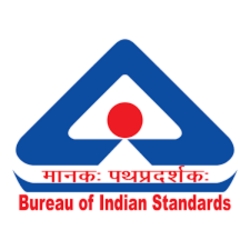
We were recently contacted by a Pune-based manufacturer after the aluminium-zinc-coated steel coils from his factory were held at a client’s yard due to the lack of BIS Certification as per IS 15961:2012. The material was functioning as expected, but the absence of the licence was stopping the delivery of goods and causing payment delays. Similar interruptions have become a regular feature, as OEMs and contractors are certified supplying. Most manufacturers are not challenged in terms of product quality but rather in understanding the BIS documents, testing their own products, and anticipating inspections. Bureau of Indian Standards
What is IS 15961:2012?
IS 15961:2012 is the Indian Standard that defines the technical and quality requirements for hot dip aluminium-zinc alloy metallic coated steel strip and sheet. The standard demands the coating to be performance, corrosion-resistant and mechanically strong to conform to the requirements for industrial and structural use.
Key Points:

- The standard applies to aluminium-zinc alloy coated steel, uncoated steel.
- The industrial standard also defines coating mass, alloy composition, and surface uniformity.
- It provides for bending tests, adhesion tests, and mechanical properties.
- This is thus making solar, roofing, appliance, and construction industries to be operational continuously.
- BIS certification is a must for a product to be sold or imported in India. ISI MARK
Why is BIS Certification Mandatory
BIS certification is a must as the Ministry of Steel has placed aluminium-zinc alloy coated steel under Quality Control Orders, hence, conformity with IS 15961:2012 is mandatory for a product to be sold or imported in India.
Key Points:
- Make sure that the coating quality, corrosion resistance, and mechanical strength are up to the standard set by the country.
- Stops substandard or uneven materials from being used in situations that require safety or reliability.
- Protects users in sectors such as roofing, solar structures, appliances, and construction.
- Promotes uniform manufacturing practices across domestic and imported products.
- Enables regulatory monitoring through the ISI mark and periodic BIS inspections.
Importance and Benefits of BIS Certification
| Importance | Benefits |
| Ensures material meets IS 15961:2012 quality and safety requirements | Higher customer trust and acceptance in roofing, solar, and industrial projects |
| Prevents low-grade aluminium-zinc coated steel from entering the market | Reduced rejection rates and fewer quality disputes |
| Creates uniform standards for manufacturers and importers | Easier approvals from OEMs and government bodies |
| Protects end users in corrosive or high-load environments | Longer product life and better performance |
| Supports regulatory compliance under Quality Control Orders | Legal clearance for sale and smoother market access |
Step-by-Step Process of BIS Certification

Step1:Documentation
- Collect required business and product documents
- Ensure compliance with BIS standards
- Prepare technical files and product details
- Verify authenticity of all submitted records
Step2:Product Testing
- Send product samples to a BIS-recognized lab
- Conduct tests as per relevant Indian Standards (IS)
- Obtain an official test report
- Fix issues if the product fails and retest
Step3:Application Submission
- Fill out the BIS registration form online
- Upload documents and test reports
- Pay the required government fees
- Track application status on the BIS portal
Step4:Scrutiny and Inspection
- BIS reviews documents and test reports
- Factory inspection may be conducted (if applicable)
- Clarifications or additional documents may be requested
- Compliance is verified before approval
Step5:Grant of License
- BIS issues the registration certificate
- Unique R-number or license number is provided
- Manufacturer can affix the BIS mark on products
- Renewal required as per BIS validity timeline
Documents Required for BIS Certification
| Category | Documents Required |
| Business Documents | Business license/registration, ISO certificate, organizational details |
| Manufacturer Details | Factory layout, process flow chart, machinery list, production details |
| Product Documents | Product specifications, component list, user manual, model details |
| Testing Documents | Test report from BIS-recognized lab, sample details, test request form |
| Legal & Compliance | Authorization letter, brand ownership proof, trademark certificate (if any) |
| Import/Foreign Manufacturer (If applicable) | AIR (Authorized Indian Representative) details, contract agreement, overseas manufacturer documents |
Timelines, Costs, Validity & Renewal
- Timelines: Usually from 20 to 30 days, with only 7-15 days for the testing.
- Costs: The cost of the government and the test varies depending on the product. There can be some additional charges though.
- Validity: The validity period is 2 years in most situations.
- Renewal: The renewal is done before the expiration; there should be updated documents/tests; the renewal
Why Choose Diligence Certifications
- Expert team with strong BIS and regulatory knowledge
- Fast, streamlined processing to reduce approval delays
- Accurate documentation and testing coordination
- Transparent guidance with clear communication
- High success rate and complete end-to-end support
Conclusion
BIS Certification for hot dip aluminium-zinc alloy metallic coated steel strip and sheet under IS 15961:2012 has essentially become a necessity for producers and importers in India. As the industry demand is majorly directed towards certified materials, adherence to the standard ensures an easier access to the market, a higher level of trust from the customers and fewer disputes related to quality. The certification goes smoothly and does not interfere with production when the documentation, testing and process control are already aligned from the beginning. Diligence Certifications is committed to working with coating lines of any size in completing documentation, preparing for the pre-inspection and being there for every stage of the BIS approval journey.
Frequently Ask Questions
What is IS 15961:2012?
IS 15961:2012 refers to an Indian standard that specifies the quality requirements, the coating mass, the corrosion resistance, and the mechanical properties of the hot-dip aluminium-zinc alloy metal-coated steel strip and sheet.
Is aluminium-zinc alloy coated steel subjected to BIS certification necessary?
Yes. The Ministry of Steel has declared the product as one that comes under the Quality Control Order and therefore a BIS certificate is compulsory for the manufacture, sale, or import of the product in India.
Who is required to obtain BIS certification under IS 15961:2012?
Domestic and foreign manufacturers of aluminium-zinc alloy-coated steel strips and sheets, which are either sold to Indian buyers or imported into India, should obtain BIS certification.
What are the test requirements for BIS Certification as per IS 15961:2012?
The testing of samples should involve determining coating mass, coating uniformity, corrosion resistance, bend and adhesion; tensile properties; and visual inspection.
How long does the BIS Certification process take?
The whole procedure usually requires 20-30 days. In addition, 7-15 days is the period for product testing in a laboratory recognized by BIS.
What documents are needed for BIS Certification?
Important documents are the registration of the factory, process flow chart, machinery list, ISO certificate, product specifications, test report, layout, and compliance documents.
Does BIS conduct a factory inspection?
BIS is admitted to the plant for inspection. The Manufacturing Processes, Testing Facilities, and Quality Control Systems are the areas of the plant they check to confirm the information provided in the application for a license.
What happens if the product fails testing?
If the product tests do not demonstrate the requirements, the manufacturers should rectify the problems and, then, submit the samples for retesting. Only after the success of the new tests will BIS approval be granted.
What is the validity of the BIS license?
The BIS license is normally valid for up to 2 years and may be renewed upon submission of updated documentation and verification of the standard compliance continuation.
What are the benefits of BIS Certification for aluminium-zinc coated steel?
The advantages are: conformity with the law; customer loyalty; less product rejection; enhanced market access; product quality improvement; and OEMs and contractors' greater acceptance.






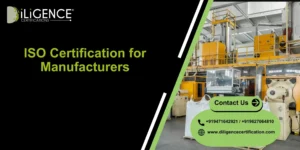
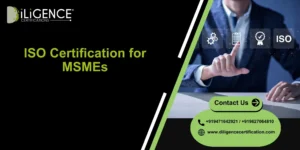
 BIS Certification
BIS Certification
 CDSCO
CDSCO
 CPCB
CPCB
 LMPC
LMPC
 WPC Approval
WPC Approval
 Global Approvals
Global Approvals
 TEC
TEC
 ARAI
ARAI
 BEE
BEE
 ISO Certification
ISO Certification
 DGCA Certification
DGCA Certification
 NOC For Steel
NOC For Steel



















 Business Registration
Business Registration















 Legal Services
Legal Services
 Trademark Registration
Trademark Registration
 Copyright Registration
Copyright Registration
 Patent Registration
Patent Registration
